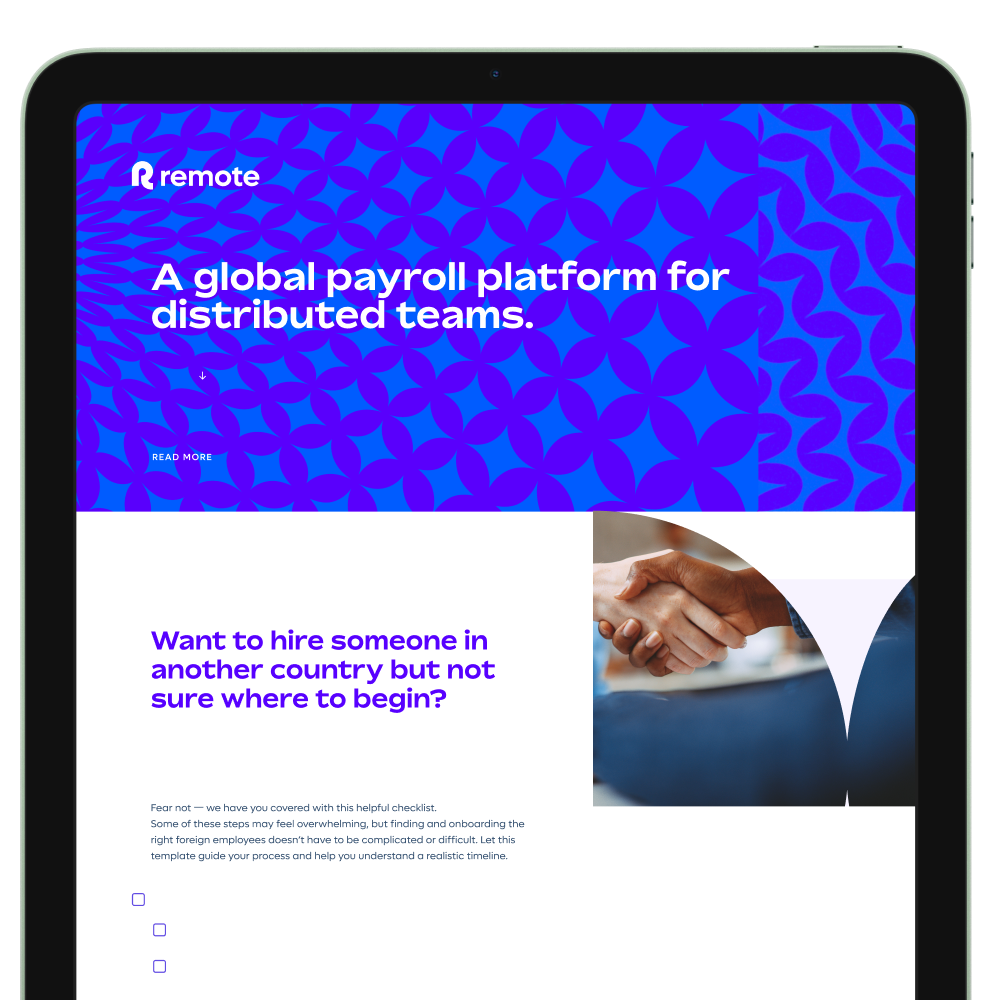
Product Updates — 7 min

Employer of Record & PEO — 7 min
Maybe you know the terms employer of record (EOR) and professional employer organization (PEO). You may even know how these HR partners operate. But do you know which one is best for your business?
This helpful guide breaks down how an EOR company operates in clear language so you can make the best decision for your business. No fluff — just the information you need to take your global hiring to the next level.
An EOR helps a business employ workers in a different country, state, or province. For example, Remote operates as an EOR in all of our covered locations.
Historically, cost barriers have prevented all but the most well-funded businesses from hiring global workforces. Today, though, the EOR model provides access to global talent to companies of all sizes.
EORs also:
Ensure legal compliance
Manage payroll administration
Oversee employee benefits
Streamline the onboarding process
Handle offboarding processes
Provide comprehensive HR support
EORs align hiring practices with local labor and tax laws. They protect businesses from legal risks and potential fines associated with non-compliance.
EORs make sure payroll is paid accurately and on time across various locations. That includes managing local tax withholdings and salary payments. Doing this eases the administrative burden on the business.
EORs manage employee benefits, such as health insurance and retirement plans. They help businesses attract and retain top talent through locally competitive benefits packages.
These entities handle the entire onboarding process for new employees. They set up employment contracts, manage the necessary documents, and provide orientation resources. These actions integrate new hires quickly and efficiently.
EORs terminate employment contracts legally. They handle severance, final paychecks, and exit interviews to make sure the employee-employer relationship ends smoothly.
EORs offer comprehensive HR support, including handling employee grievances, conducting performance reviews, and managing employee relations. Ultimately, they help maintain a positive work environment.
EOR businesses make global employment possible for companies that don’t have legal entities where they hire.
Imagine finding the perfect engineer for your business. Sadly, that engineer lives in France, and you’re based in Silicon Valley.
You want to make it work, so you look into your options. You could onboard the person as a contractor, but your ideal hire may not want to work without the security and benefits of full-time employment. So, you look into opening a legal entity to hire your first French employee, thinking you may hire a few more later.
Without a dedicated international expansion team and significant resources, you quickly run into trouble. French regulators have questions. You have to fly to France, not once but several times, to complete all the documentation. At Remote, it took us several months, several thousand dollars, and multiple flights with our CEO on board to open our French entity this year.
International employment law is beyond complicated. The more countries you try to understand and manage, the more complex things become. Remote helps employers hire workers in a variety of U.S. states, Canadian provinces, and countries around the world, and we own the legal infrastructure to do so in every location where we operate.
For companies with concerns beyond international employment law (like their own customers, products, and visions), EORs make global employment possible.
Here are three reasons to choose an EOR:
EORs let businesses hire employees from anywhere in the world without needing to establish a legal entity in each location. This means you can hire the best candidates wherever they’re located.
Not only do they help businesses overcome geographical boundaries, but EORs also provide local expertise. They help their clients integrate cultural nuances and local practices for an inclusive, unified workplace.
As mentioned, global hiring is complex. But with EORs, it doesn’t have to be.
These entities can handle the legal requirements, payroll and benefits, and many of the administrative tasks involved in global hiring. They can also process visas and maintain local tax compliance.
And they do so for an easy-to-manage flat fee.
EORs free up businesses to work on their primary strategies and goals. That means more focus on innovation and problem-solving since a lot of the admin involved in managing employees is handled. This creates a flourishing workplace for employees.
EORs also make sure that employees in all locations are cared for equally. That leads to better satisfaction across global teams.
An EOR model is invaluable for certain scenarios.
For one, if a company is looking to expand to new countries, teaming up with an EOR can save it from many headaches. But there may also be short-term situations that are best resolved by partnering with one of these entities.
Let’s examine both of these scenarios.
Companies looking to enter new international markets can benefit greatly from teaming up with an EOR.

They can hire employees quickly and in full compliance, which means lower setup and operational costs and fewer legal risks.
For instance, a tech company that wants to hire software developers in multiple countries can rely on an EOR to keep them compliant and manage payroll — making for easy expansion.
Some short-term projects require local expertise or specialists but not long-term commitments.
An EOR company makes it feasible to hire needed talent without committing to long-term employment.
EORs operate under local labor laws for the duration of a project, making it affordable and easy enough to justify short-term arrangements.
For example, an engineering firm that needs specialists for a two-year project in Brazil could use an EOR to hire talent for the length of the project.
One of the best ways to understand what an EOR does is to look at a few alternative models. PEOs and staffing agencies are similar models, but they’re used for different purposes.
Let’s clarify the distinction.
An EOR takes on full legal responsibility for a company’s employees. They’re also more involved with onboarding, payroll and benefits, and different types of employment.
Since they handle all the legal and administrative aspects of employment, EORs are the most robust option of the three when it comes to expanding a workforce internationally.
A PEO co-employs workers alongside the client company. They share certain HR tasks and legal responsibilities within the client’s home country.
PEOs are less suited for managing international compliance and global workforce expansion. They’re a good option for domestic HR management.
A staffing agency provides temporary or contract workers to fill short-term or project-based roles.
They handle recruiting, selecting, and placing workers. But they don’t manage long-term employment or compliance. They’re the least comprehensive of the three options discussed here.
Staffing agencies are suitable for businesses that need flexible staffing solutions for specific projects or seasonal work.
An EOR is the best option for a global company because you get maximum compliance and support. That means less headaches and lower risk as you expand your team globally.
With an EOR, you can do things the other two options simply can’t. For hiring and managing a global team smoothly and efficiently, it’s a no-brainer.
In knowing that the administrative and legal aspects of your global workforce are in expert hands, you can focus on operations and your overarching vision.

EOR pricing models come in two flavors: flat fee structures and percentage structures. When you decide to work with an EOR, skip any potential partner that charges a percentage instead of a flat fee.
Percentage-based EORs disincentivize their client companies from offering fair compensation to workers. When you pay a percentage rate, you have to fork over more money to a third party to give an employee a raise or a promotion. Though percentage-based EORs used to be the industry standard, that dynamic has begun to change.

Flat fees allow you to hire the best global talent and pay them what they deserve, no questions asked. Remote offers the best pricing of any EOR in the industry. For one low flat rate with no hidden fees, you can hire any worker, from a CEO to a software developer, in any of our covered regions. There are no transaction fees and no percentages tied to salaries — just straightforward and honest pricing.
Read about Remote's Fair Price Guarantee and how we make it easy for companies to hire and pay global teams.
On paper, your employees work for your EOR in their local region. In every meaningful sense, they work for you.
Your EOR provides outsourced HR services for employees outside your home region. Instead of hiring your own lawyers, accountants, payroll providers, and other professionals, you depend on your EOR to handle the details on your behalf. Your international and out-of-state employees receive their paychecks from the EOR, but they work within your company just like your domestic employees.
When selecting an EOR, don’t limit your considerations to payroll and benefits management, although those factors are important. Consider the experience of your employees as well. The right EOR will ensure that your distributed team members do not feel like second-class citizens but like valued members of your cohesive team.
Remember to ask about the protection of your IP and invention rights, too. EORs without sufficiently robust partner networks in their covered regions may not have the legal expertise to protect the intellectual property created by your employees. Remote strongly protects the IP and invention rights of our clients by owning proprietary relationships with providers in all our covered areas.
Learn more about how Remote protects your intellectual property abroad with Remote IP Guard
Work through this checklist to help you stay compliant when you're employing across borders.

As with any partnership, it’s important to first identify your unique needs and goals.
The three steps to choosing the right EOR for your business are as follows:
Determine what specific services you require.
Consider your company's global expansion plans and compliance needs.
Evaluate the scale of your hiring needs — do you need full-time employees, contractors, or both?
Look for the following features in your EOR:

Global compliance: Make sure the EOR can handle compliance with local labor laws and tax regulations in every country you plan to hire.
Payroll and benefits management: You want comprehensive payroll processing and benefits packages that are competitive and compliant.
Employee lifecycle management: Verify that the EOR can manage onboarding, offboarding, and everything in between.
HR support: Robust HR support, including employee relations and performance management, is important.
Platform capabilities: The platform you use should offer full visibility of employee data, robust reporting, expense management, and leave management.
Entity ownership: Verify whether the EOR owns their entities in each country or outsources them to third parties. Ownership typically means better control and reliability.
We want to leave you with the following questions to ask your potential partnering agency to determine the right fit:
How do you guarantee compliance with local labor laws and tax regulations?
What’s included in your service package when it comes to payroll and benefits management?
How do you handle the onboarding and offboarding processes?
Can you provide references from clients in similar industries or regions?
What additional HR support services do you offer?
How would your platform integrate with our existing systems?
Ready to hire an employee in a new region? Remote can help you onboard your workers in just a few days. Sign up now and begin onboarding in minutes.
Have questions? Reach out and let us know! We’d love to discuss your plans to grow your global team.
Subscribe to receive the latest
Remote blog posts and updates in your inbox.

Product Updates — 7 min

Global Payroll — 2 min

Minimum Wage & Compensation — 7 min

Newsroom — 5 min